Four SCS Faculty Members Named University Professors
Byron SpiceFriday, May 15, 2020Print this page.
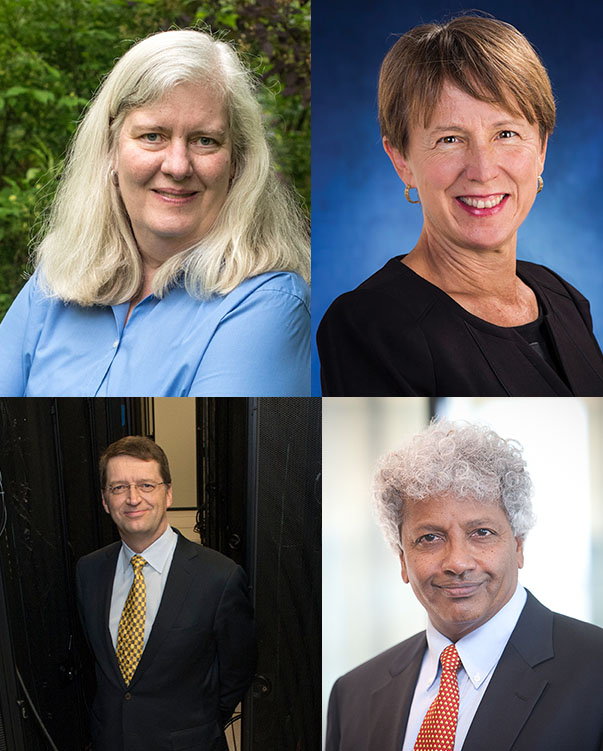
Four faculty members from the School of Computer Science have been elevated to the rank of University Professor, the highest distinction a faculty member can achieve at Carnegie Mellon University.
The newly appointed University Professors are Jessica Hodgins, Kathryn Roeder, Tuomas Sandholm and Mahadev Satyanarayanan. They join three other CMU professors who are being honored this year: Allen L. Robinson of the College of Engineering, Susanne Slavick of the College of Fine Arts, and Joe William Trotter Jr. of the Dietrich College of Humanities and Social Sciences. The new University Professors will be recognized at a future event.
"University Professors are distinguished by international recognition and for their contributions to education, artistic creativity and/or research," said Provost Jim Garrett. "Each University Professor exemplifies a high level of professional achievement, and an exceptional commitment to academic excellence at our university."
Garrett said the professors were nominated and recommended by academic leaders and faculty who have achieved the designation of University Professor.
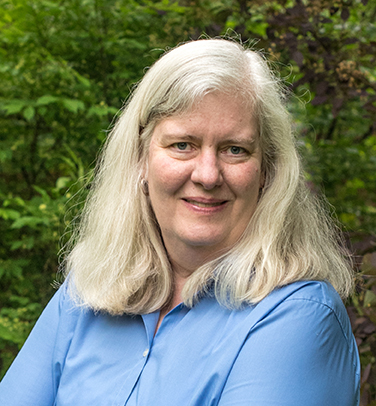
Jessica Hodgins
Jessica Hodgins is a professor of computer science and robotics in the School of Computer Science and also directs the Facebook Artificial Intelligence Research laboratory in Pittsburgh. Her research focuses on computer graphics, animation and robotics with an emphasis on generating and analyzing human motion. She is the former vice president for research at Disney Research.
Hodkins received her Ph.D. in computer science at CMU in 1989 and served as an associate professor and assistant dean in the College of Computing at the Georgia Institute of Technology before joining the CMU faculty in 2000. She served as associate director of faculty in the Robotics Institute from 2005 to 2015.
Hodgins is president of the Association for Computing Machinery's (ACM) Special Interest Group on Computer Graphics and Interactive Techniques (SIGGRAPH). She received the SIGGRAPH Computer Graphics Achievement Award in 2010. In 2017, she garnered SIGGRAPH's highest honor, the Steven Anson Coons Award for Outstanding Creative Contributions to Computer Graphics, for her foundational work in character animation, her support and cultivation of emerging researchers, and her extensive volunteer service to the computer graphics community. She is also an ACM fellow.
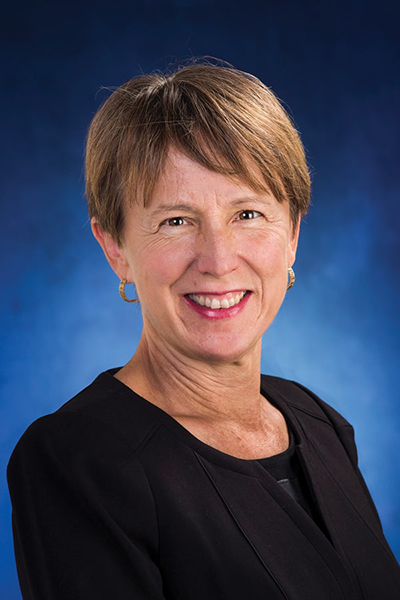
Kathryn Roeder
Kathryn Roeder, the UPMC Professor of Statistics and Life Sciences, holds appointments in the Department of Statistics & Data Science and the Computational Biology Department. She also served as the university's vice provost for faculty from July 2015 through June 2019.
Roeder started her research career in biology but was soon drawn to statistics. Her first major data project was in DNA forensics, helping to solidify the credibility of this form of evidence in the judicial system. As her scientific career advanced, Roeder transitioned to developing statistical and machine learning tools for finding associations or patterns in data. She focuses on high-dimensional inference problems with applications such as analyzing variation in the whole human genome and how it relates to disease. Her work has contributed to a better understanding of schizophrenia, autism and other genetic disorders.
Roeder has published more than 150 scholarly articles. She has been elected to the National Academy of Science and is a fellow of the American Association for the Advancement of Science (AAAS), the American Statistical Association and the Institute of Mathematical Statistics. She received the Snedecor Award for outstanding work in statistical applications and the Janet L. Norwood Award for outstanding achievement by a woman in statistical sciences. The Committee of Presidents of Statistical Societies bestowed its Presidents' Award for the outstanding statistician under age 40 upon her, and she is the organization's 2020 Fisher Lectureship Award recipient.
Roeder previously served as the statistics section chair for AAAS and has played an integral role in organizing conference sections aimed at helping her community improve how statistics are communicated across scientific disciplines, as well as to the public.
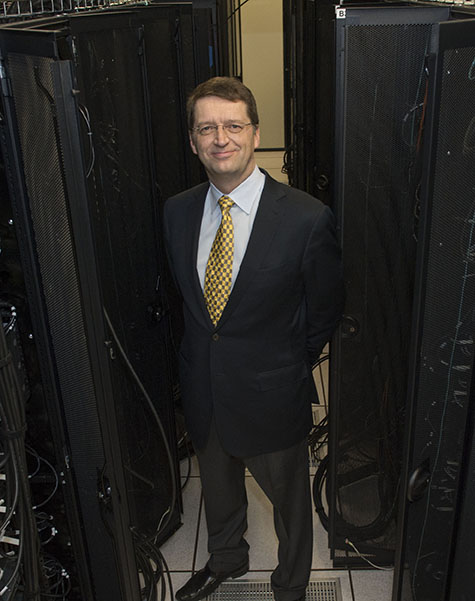
Tuomas Sandholm
Tuomas Sandholm is the Angel Jordan Professor of Computer Science and a serial entrepreneur whose research focuses on the convergence of artificial intelligence, economics and operations. He founded and directs the Electronic Marketplaces Laboratory, has published more than 500 papers, and holds 22 patents. He joined the CMU faculty in 2001.
Since 2010, Sandholm's algorithms have powered the national kidney exchange for the United Network for Organ Sharing, where they autonomously make the weekly kidney exchange transplant plan for 73% of all U.S. transplant centers. He also co-invented never-ending altruist-donor-initiated chains. His algorithms created the first of these chains, which have become the main modality of kidney exchange worldwide and have led to more than 10,000 transplants. He then invented multi-organ exchanges, and the first liver-kidney swap took place in 2019.
Sandholm has developed the leading algorithms for several general classes of game with his students. Last year, their AI, Pluribus, became the first and only AI to beat professional poker players at multiplayer No-Limit Texas Hold'em, the first AI milestone in any game with more than two players. Sandholm has also pioneered large-scale combinatorial markets. He also founded research fields such as market clearing algorithms, structured bidding languages, preference elicitation from multiple parties and automated mechanism design.
He's received numerous awards, including the prestigious Marvin Minsky Medal for his work on computer poker; the Computers and Thought Award; the inaugural ACM Autonomous Agents Research Award; the Allen Newell Award for Research Excellence; a Sloan Fellowship; the Carnegie Science Center Award for Excellence; an Edelman Laureateship; and an NSF Career Award. He is fellow of the ACM, AAAI and INFORMS. He holds an honorary doctorate from the University of Zurich.
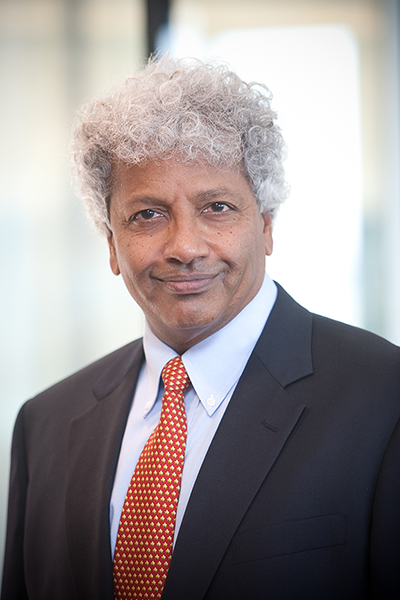
Mahadev Satyanarayanan
Mahadev Satyanarayanan, best known as Satya, is the Carnegie Group Professor of Computer Science. His multidecade research career has focused on the challenges of performance, scalability, availability and trust in information systems that reach from the cloud to the mobile edge of the internet.
In the course of this work, Satya has pioneered many advances in distributed systems, mobile computing, pervasive computing and the internet of things (IoT). Examples include his work as principal architect of CMU's pioneering Andrew File System in the 1980s, his research on disconnected and weakly connected mobile data access in the Coda File System in the early 1990s, his work on adaptive and energy-efficient mobile computing in the Odyssey system in the late 1990s and early 2000s, and his most recent efforts to establish the field of edge computing.
Satya directs the Living Edge Laboratory, which explores edge computing in live settings. By introducing a new computing tier between the cloud and mobile/IoT devices, edge computing makes powerful computational resources available via low-latency and high-bandwidth wireless networks. One of his projects, called Gabriel, leverages edge computing to amplify human cognition in real time for complex task guidance.
Satya earned his Ph.D. in computer science at CMU in 1983. An Association for Computing Machinery (ACM) and IEEE fellow, he has received numerous awards, including the Association for Computing Machinery's prestigious Software System Award for his work on the Andrew File System.
Byron Spice | 412-268-9068 | bspice@cs.cmu.edu<br>Virginia Alvino Young | 412-268-8356 | vay@cmu.edu
